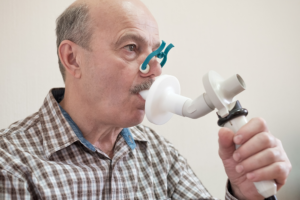
Asthma is a long-term lung condition. People with asthma have sensitive airways in their lungs which react to triggers, causing a ‘flare-up’. In a flare-up, the muscles around the airway squeeze tight, the airways swell and become narrow and there is more mucus. These things make it harder to breathe.
An asthma flare-up can come on slowly (over hours, days or even weeks) or very quickly (over minutes). A sudden or severe asthma flare-up is sometimes called an asthma attack.
One in nine people in Australia has asthma. It affects people of all ages. Some people get asthma when they are young; others when they are older.
Asthma cannot be cured, but for most people it can be well controlled by following a daily management plan.
Asthma symptoms
A person’s asthma symptoms can vary over time – sometimes they will have no symptoms, especially when their asthma is well-controlled. Symptoms often vary from person to person, but they are most commonly:
- feeling short of breath
- a feeling of tightness in the chest
- wheezing – a continuous, high pitched sound coming from the chest while breathing
- coughing
Symptoms often occur at night, early in the morning or during/just after activity.
If your asthma is well controlled, you should experience very few asthma symptoms.
Possible causes of asthma
- Asthma an allergies are closely linked. People with asthma often have a family history of asthma, eczema and hayfever, but not everyone with asthma has allergies.
- Asthma can develop at any age.
- Indoor and outdoor pollution (including moulds, gases, chemicals, particles and cigarette smoke) can increase the risk of developing asthma.
- Occupational asthma may be caused by exposure to some substances in the workplace.
- Obesity increases the risk of developing asthma.
- Smoking in pregnancy can damage a baby’s lungs and lead to respiratory illness.
Diagnosis
There is no single test for asthma. Your doctor will determine whether you have asthma based on talking to you, examining you and performing some lung function tests.
A diagnosis of asthma is more likely if you have eczema or hayfever or have close relatives with allergies and/or asthma, and if your symptoms;
- keep coming back, or happen at the same time each year;
- are worse at night or early morning;
- are clearly triggered by exercise, allergies or infections;
- improve quickly with reliever medication
It’s often difficult to diagnose asthma in young children, especially as they can’t do the breathing tests. Your doctor will assess the symptoms and history and may give asthma medicine to see what effect it has on your child, so it can take some time to achieve a diagnosis.
Once your child reaches the age of 6 or 7 they should be able to perform a lung function test.


